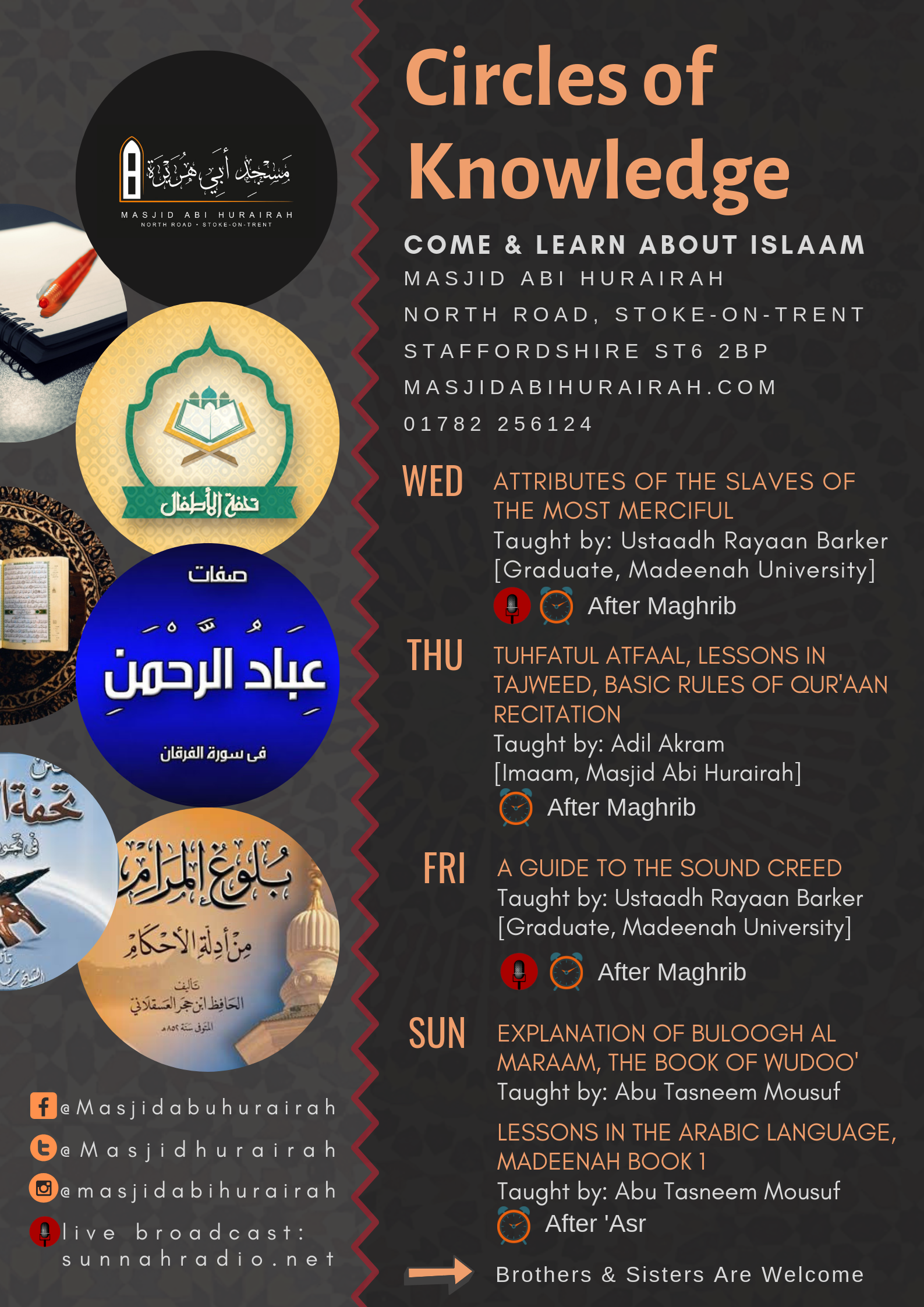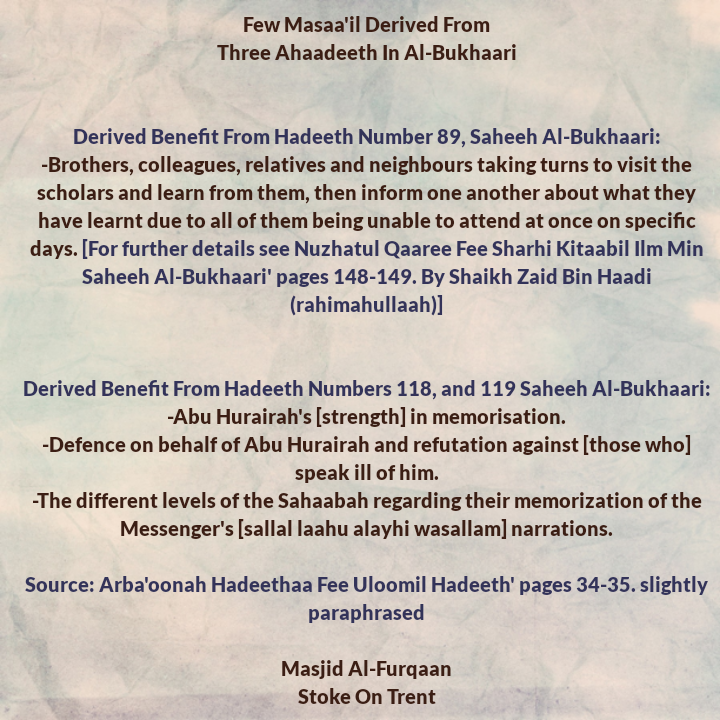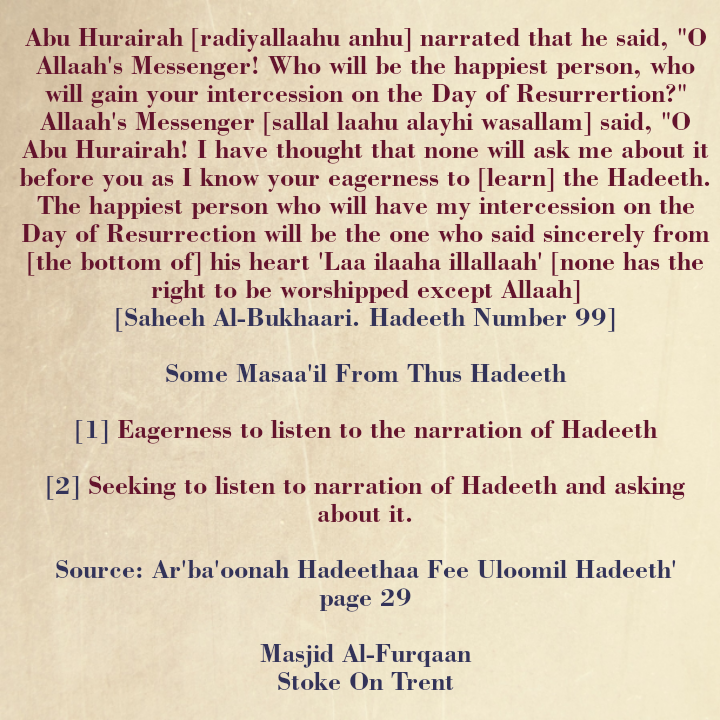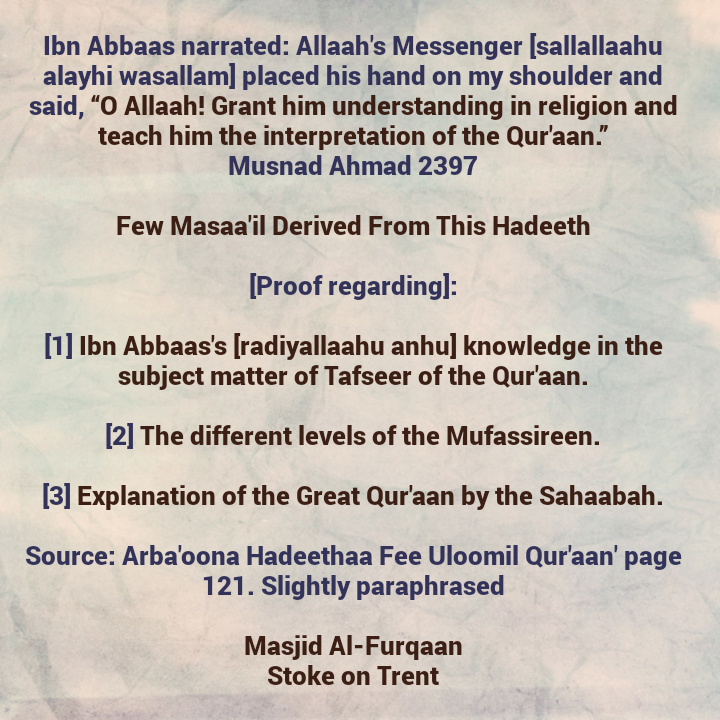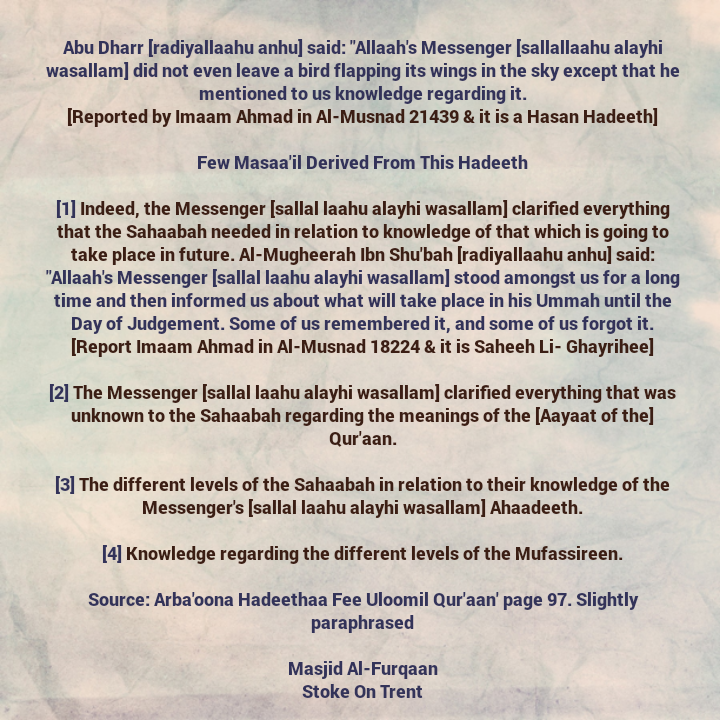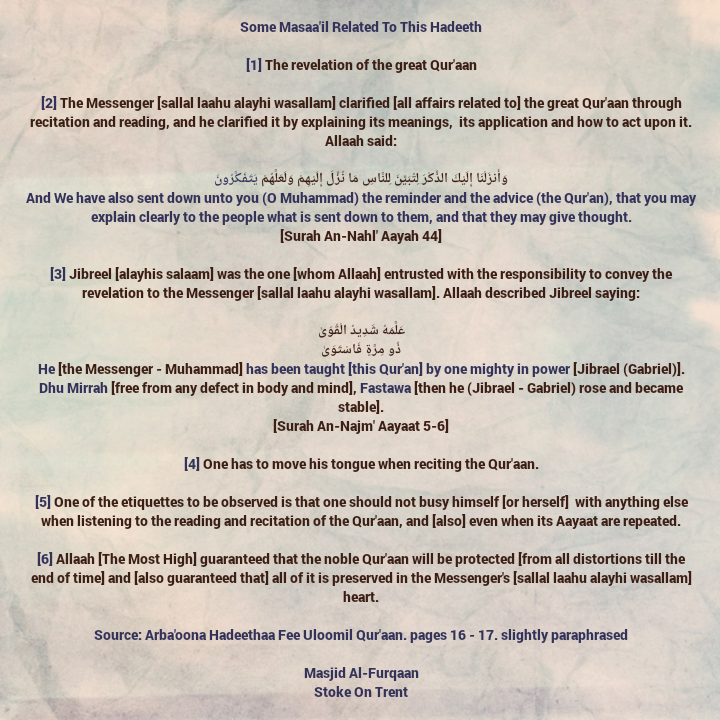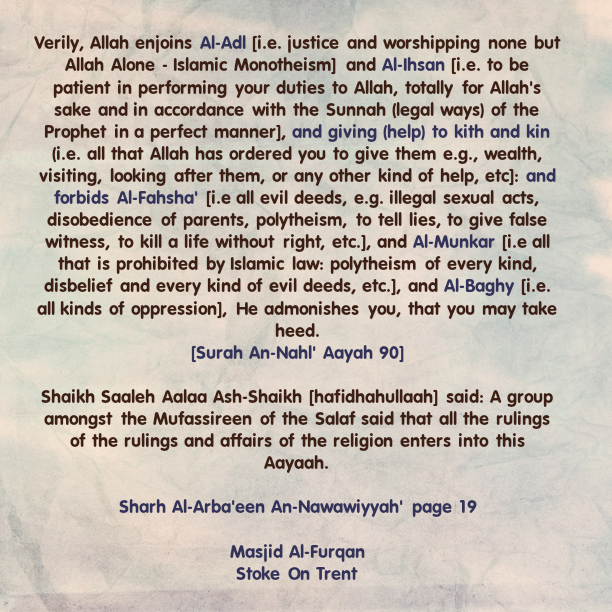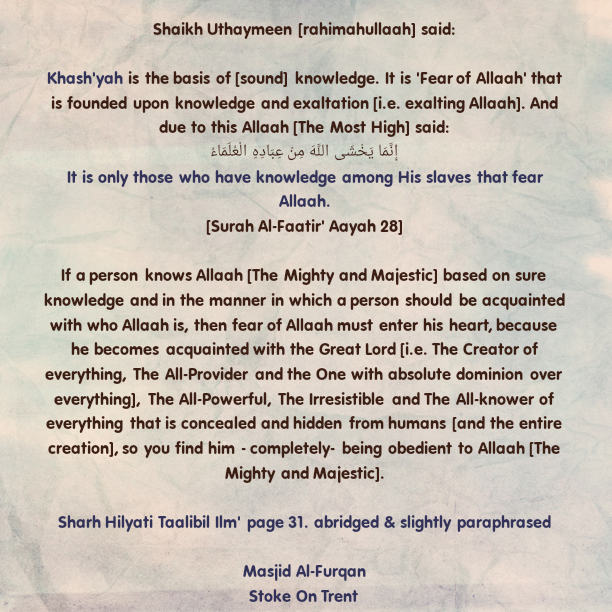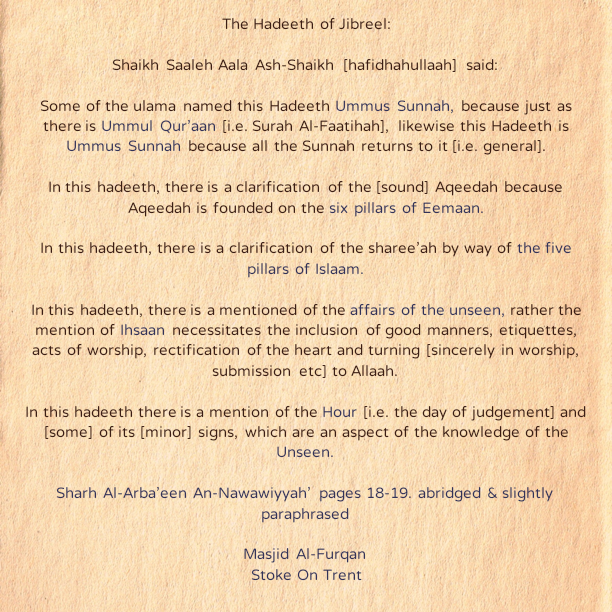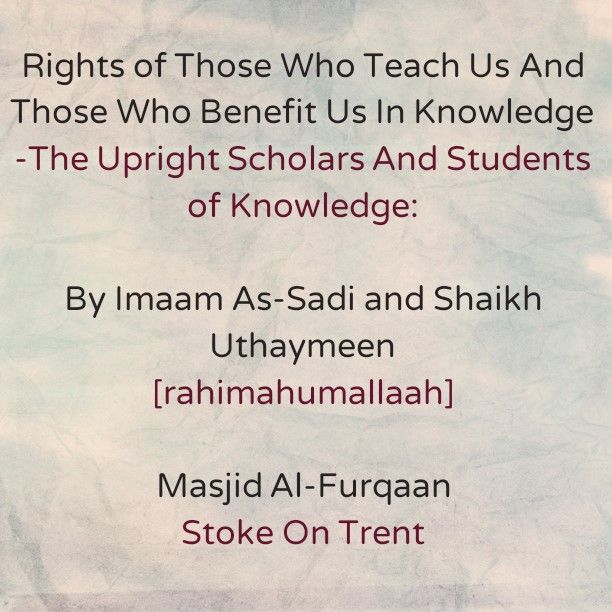Tag: knowledge
Few Masaa’il From Three Ahaadeeth Regarding: Taking Turns to Attend Gatherings of Knowledge, The Different Levels of The Sahaabah in Memorization And a Defence of Abu Abu Hurairah
Written by Jallow Abdullah on . Posted in Refutations, Scholars of Islam, The Salaf - Pious Predecessors.
In The Name of Allaah, The Most Merciful, The Bestower of Mercy
Umar [radiyallaahu anhu] narrated: My Ansaari neighbour from Bani Umayya bin Zaid who used to live at ‘Al-Awaalee Al-Madeenah and I used to visit the Prophet [sallal laahu alayhi wasallam] by turns. He used to go one day and I another day. When I went, I used to bring the news of that day regarding the Divine Revelation and other things, and when he went, he used to do the same for me.
[Bukhaari. Number 89]
Abu Hurairah [radiyallaahu anhu] said: People say that I have narrated many Ahaadeeth [the Prophet’s narrations]. Had it not been for two Verses in the Qur’an, I would not have narrated a single Hadeeth, and the Verses are: “Verily, those who conceal the clear proofs, and evidences and the guidance, which We have sent down, after We have made it clear for the people in the Book, they are the ones cursed by Allah and cursed by the cursers. Except those who repent and do righteous deeds, and openly declare [the truth which they concealed]. These, I will accept their repentance. And I am the One Who accept repentance, the Most Merciful.” [Surah Al-Baqarah’ Aayaat 159-160]. And no doubt our Muhaajir [emigrant] brothers used to be busy in the market with their business [bargains] and our Ansaari brothers used to be busy with their property [agriculture]. But I used to stick to Allaah’s Messenger [sallal laahu alayhi wasallam], contented with what will fill my stomach and I used to attend that which they used not to attend and I used to memorize that which they used not to memorize.
[Bukhaari Number 118]
Abu Hurairah [radiyallaahu anhu] said: I said to Allaah’s Messenger. “I hear many narrations from you but I forget them.” Allaah’s Messenger [sallal laahu alayhi wasallam] said, “Spread your Rida’ [garment].” I did accordingly and then he moved his hands as if filling them with something [and emptied them in my Rida’] and then said, “Take and wrap this sheet over your body.” I did it and after that I never forgot anything. Narrated Ibraaheem bin AI-Mundhir: Ibn Abee Fudaik narrated the same as above. [Bukhaari. Number Hadith 119]
___________________________________________
Al-Arba’oonah Hadeethaa Fee Fee Uloomil Hadeeth. pages 34-35. By Shaikh Muhammad Baazmool [hafidhahullaah]
The Happiest Person Who Will Gain The Prophet’s Intercession On The Day of Judgement
Written by Jallow Abdullah on . Posted in Belief - 'Aqeedah', Calling To Islam - 'Da'wa', Scholars of Islam, Seeking Knowledge, The Salaf - Pious Predecessors, Worship - 'Ibaadah'.
In The Name of Allaah, The Most Merciful, The Bestower of Mercy
Abu Hurairah [radiyallaahu anhu] narrated that he said, “O Allaah’s Messenger! Who will be the happiest person, who will gain your intercession on the Day of Resurrertion?” Allaah’s Messenger [sallal laahu alayhi wasallam] said, “O Abu Hurairah! I have thought that none will ask me about it before you as I know your eagerness to [learn] the Hadeeth. The happiest person who will have my intercession on the Day of Resurrection will be the one who said sincerely from [the bottom of] his heart ‘Laa ilaaha illallaah’ [none has the right to be worshipped except Allaah]
Saheeh Al-Bukhaari. Hadeeth Number 99
Some Masaa’il From Thus Hadeeth
[1] Eagerness to listen to the narration of Hadeeth
[2] Seeking to listen to narration of Hadeeth and asking about it.
___________________________________________
Source: Ar’ba’oonah Hadeethaa Fee Uloomil Hadeeth’ page 29.
By Shaikh Muhummad Baazmool
[Hafidhahullaah]
[9] Series: Ahaadeeth Related to Uloom Al-Qur’aan -[The Messenger’s Supplication For Ibn Abbaas]
Written by Jallow Abdullah on . Posted in Qur'aan, Scholars of Islam, The Salaf - Pious Predecessors, Worship - 'Ibaadah'.
In The Name of Allaah, The Most Merciful, The Bestower of Mercy
Ibn Abbaas narrated: Allaah’s Messenger [sallallaahu alayhi wasallam] placed his hand on my shoulder and said, “O Allaah! Grant him understanding in religion and teach him the interpretation of the Qur’aan.”
Musnad Ahmad 2397
Few Masaa’il Derived From This Hadeeth
[Proof regarding]:
[1] Ibn Abbaas’s [radiyallaahu anhu] knowledge in the subject matter of Tafseer of the Qur’aan.
[2] The different levels of the Mufassireen.
[3] Explanation of the Great Qur’aan by the Sahaabah.
__________________________________________
Source: Arba’oona Hadeethaa Fee Uloomil Qur’aan. page 121 By Shaikh Muhammad Baazmool [hafidhahullaah Slightly paraphrased]
[8] Series: Ahaadeeth Related to Uloom Al-Qur’aan – [Hadeeth Narrated By Abu Dhar Regarding The Fact That The Messenger Clarified All Affairs Needed By The Ummah Until The Day of Judgement]
Written by Jallow Abdullah on . Posted in Articles, Belief - 'Aqeedah', Calling To Islam - 'Da'wa', Methodology - 'Manhaj', Purification of The Soul, Qur'aan, Scholars of Islam, Worship - 'Ibaadah'.
In The Name of Allaah, The Most Merciful, The Bestower of Mercy
Abu Dharr [radiyallaahu anhu] said: “Allaah’s Messenger [sallallaahu alayhi wasallam] did not even leave a bird flapping its wings in the sky except that he mentioned to us knowledge regarding it.
[Reported by Imaam Ahmad in Al-Musnad 21439 & it is a Hasan Hadeeth]
Few Masaa’il Derived From This Hadeeth
[1] Indeed, the Messenger [sallal laahu alayhi wasallam] clarified everything that the Sahaabah needed in relation to knowledge of that which is going to take place in future. Al-Mugheerah Ibn Shu’bah [radiyallaahu anhu] said: “Allaah’s Messenger [sallal laahu alayhi wasallam] stood amongst us for a long time and then informed us about what will take place in his Ummah until the Day of Judgement. Some of us remembered it, and some of us forgot it.
[Report Imaam Ahmad in Al-Musnad 18224 & it is Saheeh Li- Ghayrihee]
[2] The Messenger [sallal laahu alayhi wasallam] clarified everything that was unknown to the Sahaabah regarding the meanings of the [Aayaat of the] Qur’aan.
[3] The different levels of the Sahaabah in relation to their knowledge of the Messenger’s [sallal laahu alayhi wasallam] Ahaadeeth.
[4] Knowledge regarding the different levels of the Mufassireen.
__________________________________________
Source: Arba’oona Hadeethaa Fee Uloomil Qur’aan’ page 97. By Shaikh Muhammad Baazmool [hafidhahullaah]
[3] Series: Ahaadeeth Related to Uloom Al-Qur’aan – [Few Fawaa’id Extracted From a Hadeeth Reported By Ibn Abbaas Regarding The Aayah: ‘Move Not Your Tongue Concerning (The Qur’aan, O Muhammad;) to Make Haste Therewith’
Written by Jallow Abdullah on . Posted in Belief - 'Aqeedah', Qur'aan, Scholars of Islam.
In The Name of Allaah, The Most Merciful, The Bestower of Mercy
Some Masaa’il Related To This Hadeeth
[1] The revelation of the great Qur’aan
[2] The Messenger [sallal laahu alayhi wasallam] clarified [all affairs related to] the great Qur’aan through recitation and reading, and he clarified it by explaining its meanings, its application and how to act upon it. Allaah said:
And We have also sent down unto you (O Muhammad) the reminder and the advice (the Qur’an), that you may explain clearly to the people what is sent down to them, and that they may give thought.
[Surah An-Nahl’ Aayah 44]
[3] Jibreel [alayhis salaam] was the one [whom Allaah] entrusted with the responsibility to convey the revelation to the Messenger [sallal laahu alayhi wasallam]. Allaah described Jibreel saying:
[Surah An-Najm’ Aayaat 5-6][4] One has to move his tongue when reciting the Qur’aan.
[6] Allaah [The Most High] guaranteed that the noble Qur’aan will be protected [from all distortions till the end of time] and [also guaranteed that] all of it is preserved in the Messenger’s [sallal laahu alayhi wasallam] heart.
A Faa’idah Related to Aayah Ninety ‘Surah An-Nahl’ -[By Sh Saaleh Aala Ash-Shaikh (hafifhahullaah)]
Written by Masjid Al Furqan on . Posted in Innovations In Islam (Bidah), Islamic Jurisprudence - 'Fiqh', Methodology - 'Manhaj', Monotheism - Tawheed, Morals and Manners - 'Akhlaaq', Purification of The Soul, Qur'aan, Scholars of Islam, The Salaf - Pious Predecessors.
Verily, Allah enjoins Al-Adl (i.e. justice and worshipping none but Allah Alone – Islamic Monotheism) and Al-Ihsan [i.e. to be patient in performing your duties to Allah, totally for Allah’s sake and in accordance with the Sunnah (legal ways) of the Prophet in a perfect manner], and giving (help) to kith and kin (i.e. all that Allah has ordered you to give them e.g., wealth, visiting, looking after them, or any other kind of help, etc.): and forbids Al-Fahsha’ (i.e all evil deeds, e.g. illegal sexual acts, disobedience of parents, polytheism, to tell lies, to give false witness, to kill a life without right, etc.), and Al-Munkar (i.e all that is prohibited by Islamic law: polytheism of every kind, disbelief and every kind of evil deeds, etc.), and Al-Baghy (i.e. all kinds of oppression), He admonishes you, that you may take heed.
What Will Make a Person to Truly Fear Allaah?! – [A Brief Reminder By Shaikh Uthaymeen (rahimahullaah)]
Written by Masjid Al Furqan on . Posted in Belief - 'Aqeedah', Monotheism - Tawheed, Morals and Manners - 'Akhlaaq', Purification of The Soul, Scholars of Islam, Worship - 'Ibaadah'.
Khash’yah is the basis of [sound] knowledge. It is ‘Fear of Allaah’ that is founded upon knowledge and exaltation [i.e. exalting Allaah]. And due to this Allaah [The Most High] said:
It is only those who have knowledge among His slaves that fear Allaah.
[Surah Al-Faatir’ Aayah 28]
Ummus Sunnah- [Why Did Some of The Scholars Give The Hadeeth of Gibreel This Name?] – Short Reminder By Shaikh Saaleh Aala Ash-Shaikh [Hafidhahullaah]
Written by Masjid Al Furqan on . Posted in Belief - 'Aqeedah', Calling To Islam - 'Da'wa', Morals and Manners - 'Akhlaaq', Purification of The Soul, Scholars of Islam, Worship - 'Ibaadah'.
An Acknowledgement of The Respect Owed To The Upright Scholars And Students of Knowledge
Written by Jallow Abdullah on . Posted in Brotherhood, Calling To Islam - 'Da'wa', Methodology - 'Manhaj', Morals and Manners - 'Akhlaaq', Purification of The Soul, Scholars of Islam, Worship - 'Ibaadah'.
Therefore, the people must have love and respect for them. They must recognise their excellence and virtue, and thank them greatly. They are to supplicate for them in private and public, and seek nearness to Allaah by having love for them and praising them. They are to proclaim their excellence; guard the hearts [from harbouring evil against them] and [prevent] the tongues [from] insulting them, for this would tarnish their excellence. [End of quote] [Ref 1]
[1] The Prophet said: Pride is to reject the truth and mock at the people.
[2] This refers to shaytaan’s behaviour when he was commanded to prostrate to Aadam, but pride prevented him from doing so. He refused and was haughty.
[3] Raising oneself can either be by way of the tongue [i.e. speech] and it can also be by way of sentiments [feelings, attitude, behaviour etc]. He [i.e. the student] might be walking with his teacher, whilst swaggering and saying: I did this and I did this.
[4] Likewise, being arrogant towards the one who is below you in knowledge is pride. This also occurs from some of the students. If someone below him in knowledge informs him of something, you find him arrogant and does not accept.
[5] We ask Allaah for wellbeing because from the types of pride is to not act upon the knowledge one knows. [Ref 2]
Ref 2: Source: Sharh Hilyati Taalibil Ilm’ pages 38-40′ by Shaikh Uthaymeen [rahimahullaah]. abridged & slightly paraphrased
